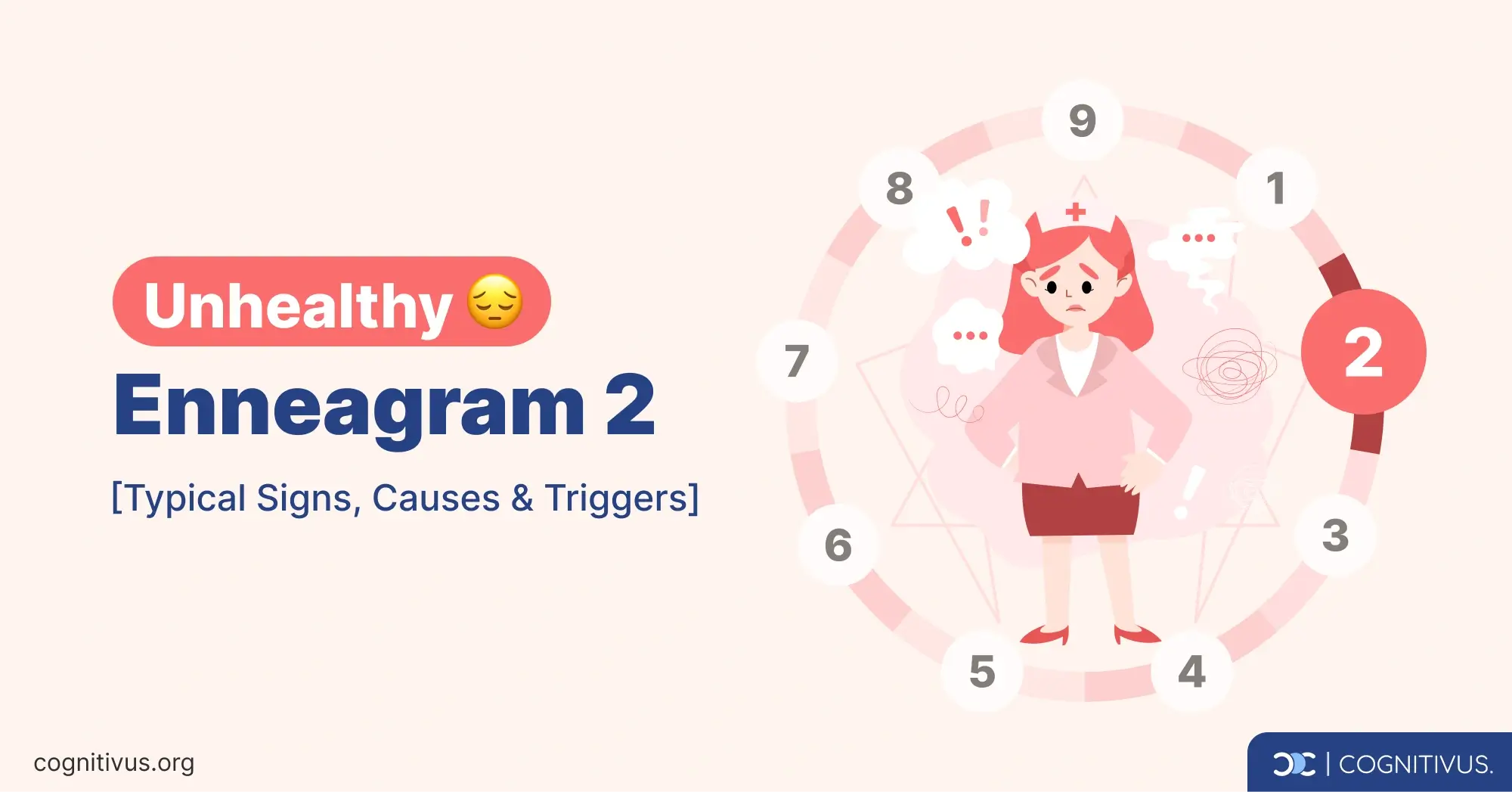Type Twos are known for being warm, compassionate, and supportive people who genuinely care for others. Their sense of self is deeply tied to being helpful and nurturing, which is a defining trait of this personality type. However, when this desire to help becomes excessive, it can lead to an unhealthy imbalance. Type Twos may begin to overcommit themselves, neglect their own needs, and become emotionally drained.
This article explores how Type 2s can turn unhealthy, how you can recognise the warning signs, and how Twos can begin to move toward a more balanced and healthy way of interacting with the world.
Understanding Enneagram Type 2
Getting to know the fundamental characteristics of Enneagram Type 2 can provide great insight into their behaviours and emotional needs.

Core Traits and Motivation of Enneagram Type 2
Enneagram Type 2s, also known as “The Helper,” have a strong need to be loved and appreciated. They usually express this by dedicating their time and energy to supporting and caring for those around them. For a healthy Type 2, this is done selflessly and without expecting anything back. But once this creeps into the unhealthy category, their craving for validation becomes much more intense, leading them to seek love and appreciation through manipulation or by getting over-involved in others’ lives.
Healthy Type 2s are generous, empathetic, and capable of balancing their needs with the needs of others. However, when they’re under stress or feel unappreciated, they might slip into unhealthy patterns where their giving becomes a way to gain attention and approval. This can result in feelings of resentment, burnout, and dissatisfaction.
As they grow, Type 2s take on some positive traits from Type 4, becoming more self-aware and emotionally in touch with their own needs. On the other hand, when unhealthy, they may start adopting some of the negative traits of Type 8, becoming controlling or emotionally manipulative in relationships.
Biggest Fears of Enneagram Type 2
At the core of Enneagram Type 2’s motivations is a deep-seated fear of being unloved or unwanted; this influences a lot of their behaviour, as they often think their worth comes from how helpful and indispensable they are to others. They believe that if they aren't actively nurturing or supporting those around them, they might be rejected or forgotten. As a result, they will go to great lengths to ensure that they are needed, sometimes at the cost of their own well-being. This underlying fear can cause them to overextend themselves and seek validation through constant acts of kindness, hoping that this will secure the love and appreciation they crave.
When this fear takes over, an unhealthy Type 2 might find themselves unable to value their own boundaries and say no, constantly putting others’ needs before their own, and feeling anxious about whether they are doing enough to be valued. This can lead to a cycle where they give more and more, but the love and appreciation they receive never quite fill the chasm of their insecurities.
10 Signs of an Unhealthy Enneagram Type 2
If you're unsure whether a Type 2 is exhibiting unhealthy behaviours, here are some key signs to watch for:
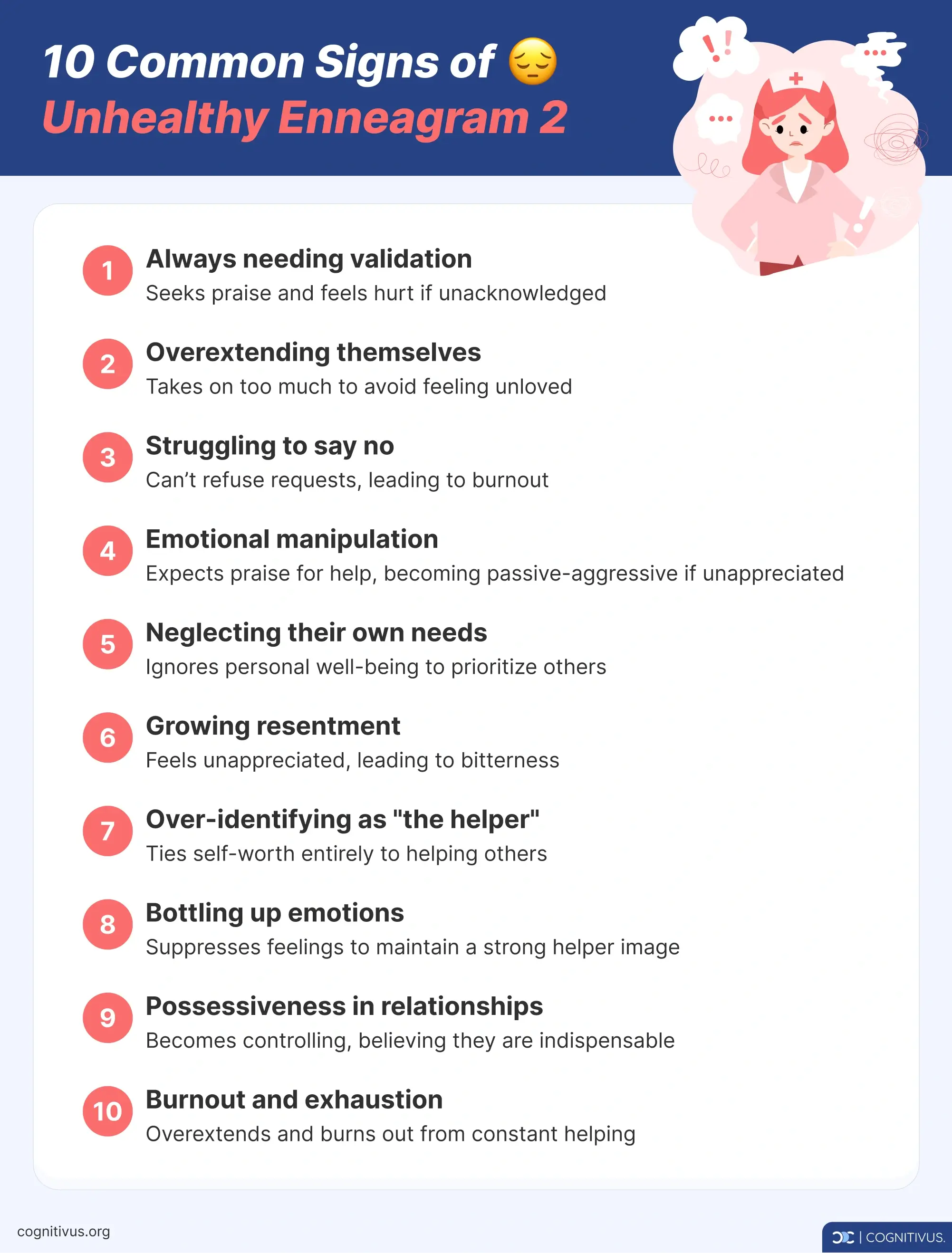
1. Always needing validation
An unhealthy Type 2 constantly looks for external praise and reassurance to feel good about themselves. They’ll go out of their way to help others but will feel hurt and angry if their efforts aren’t recognised. For instance, if they help a friend through a difficult situation but don’t receive verbal acknowledgement or a heartfelt thank-you, they may feel deeply unappreciated and hurt, as though their efforts were taken for granted.
Their self-worth can become so closely tied to how others perceive them that they constantly seek praise, which can create a cycle where they give more and more, continuously hoping for validation that makes them feel more worthy.
2. Overextending themselves
Unhealthy Twos often spread themselves too thin, taking on more than they can handle. They feel compelled to offer help even when it’s not asked for and struggle with the idea of stepping back, believing that if they don’t involve themselves in others’ issues, they will lose their place in those people’s lives. To give some examples, a Type 2 might offer to help with a friend’s move, plan a family event, and take on extra work assignments, all while juggling their own personal responsibilities.
Over time, this leads to physical and emotional exhaustion, but they keep pushing themselves because they fear stepping back means they won’t be loved or appreciated.
3. Struggling to say no
Saying no is nearly impossible for an unhealthy Type Two, as they fear that doing so will result in rejection or a loss of love. They believe that if they turn someone down, they might be seen as selfish or uncaring, which is not at all how they view themselves. So, they may take on way too much, agreeing to extra projects at work, helping friends with personal issues, and running errands for family members.
This inability to say no leaves them burnt out, resentful and exhausted.
4. Emotional manipulation
Unhealthy 2’s may use their helpfulness to manipulate situations to get what they want. While it seems they are being selflessly generous, they have the hidden expectation of getting something in return- whether that’s praise, love, or special treatment. When their unspoken expectations aren’t met, they can become passive-aggressive, withdrawing or even making the other person feel guilty for not appreciating them enough.
For instance, they might offer to help someone with a project but secretly expect gratitude or acknowledgement, and when that doesn’t come, they might make subtle comments that leave the other person feeling guilty.
5. Neglecting their own needs
A key trait of an unhealthy Type 2 is their tendency to ignore their own needs entirely. They get so caught up in helping others that they lose sight of their own physical, emotional, and mental well-being. They might skip meals, sacrifice sleep, or forego personal time just to be there for others. Over time, this constant self-neglect takes a toll, leaving them physically and emotionally drained. Yet they continue pushing themselves, thinking their worth comes only from how much they can give.
This pattern can lead to a deep sense of depletion, where they feel as though their needs don’t matter but only what they can do for others.
6. Growing resentment
When Type 2s feel underappreciated for all that they do, deep feelings of resentment start to creep in. They may feel like they are constantly giving without receiving anything back, which can lead to bitterness and frustration. For example, if they’ve been consistently helping a friend through a rough patch but don’t feel acknowledged or appreciated, they may emotionally distance themselves or express their resentment through passive-aggressive comments.
This growing resentment can really damage relationships, as the Type 2 feels undervalued and taken for granted.
7. Over-identifying as “the helper”
For an unhealthy Type 2, their sense of self-worth can become entirely wrapped up in their identity as someone who helps others. They may believe that if they are not constantly offering support, they are worthless. This can lead to an unhealthy over-identification with being a caregiver, to the point where they struggle to define who they are outside of their relationships.
Type Twos might feel anxious or aimless when they aren’t actively helping someone, unsure of their own value if they aren’t in a supportive role.
8. Bottling up emotions
Unhealthy Type 2s often suppress their own emotions because they feel that their role is to be strong for others. Despite what they may be feeling, like sadness, anger, or frustration, they push down these feelings, thinking that showing these emotions would make them appear weak or needy. This clashes with their self-image as a carer. Over time, this emotional suppression can build up and lead to unexpected outbursts or a deep sense of unhappiness, since they never allow themselves the space to feel and process their own emotions.
For instance, they might seem calm on the surface, but eventually, all that unprocessed emotion causes them to suddenly erupt in anger or tears.
9. Possessiveness in relationships
Unhealthy Twos may develop a messiah complex, believing they are the only ones capable of helping or "saving" their loved ones. This can lead to possessive or controlling behaviours, especially if they feel that the people they care for aren’t giving them enough recognition. They might start controlling decisions or actions, convinced that their way is the best and that others wouldn't manage without them. For example, they may insist on taking over situations and micromanaging their partner’s or friend’s life, believing that without their guidance, things will go wrong.
This need to feel indispensable can create tension in relationships, as loved ones may feel trapped or unable to act freely around them.
10. Burnout and exhaustion
Type Twos who take on too many tasks in an effort to help everyone around them often experience burnout. They start to run on empty, feeling physically and emotionally drained, with little energy left for themselves. This constant state of exhaustion makes it harder for them to engage in healthy, balanced relationships. As they continue to give and give without replenishing their own emotional reserves, they risk becoming completely worn out, unable to continue helping others or even taking care of themselves.
At this point, the burnout can lead to despair, as they feel that they can no longer live up to their role as the helper.
How the Wings Impact Unhealthy Enneagram Type 2
Enneagram Type 2s are influenced by their wings – either leaning toward Type 1 (The Perfectionist) or Type 3 (The Achiever). They add another layer to their personality and affect the way in which their unhealthy behaviours show up.
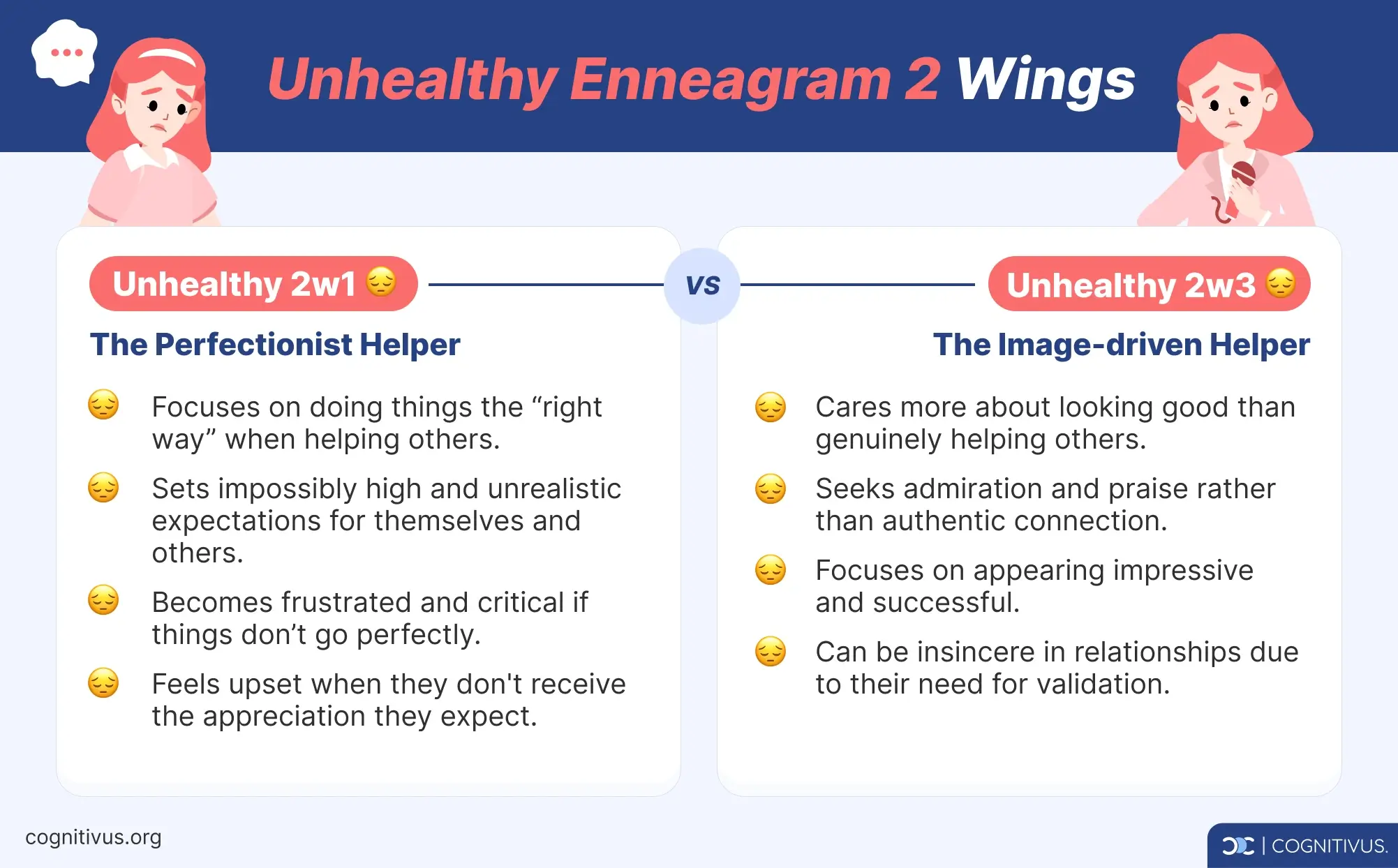
Unhealthy 2w1: The perfectionist helper
When leaning toward their Type 1 wing, unhealthy Type 2s may become overly focused on doing things the “right way” when helping others. They set unrealistic expectations for themselves and others, much like unhealthy Type 1s. If things don’t go perfectly or they don't get the appreciation they want, they can become really frustrated and critical.
Unhealthy 2w3: The image-driven helper
With a strong Type 3 wing, unhealthy Type 2s care less about the genuine act of helping and more about how good it makes them look to others, focusing instead on the admiration and praise they receive. This need to be seen as impressive and successful can therefore lead to insincerity in their relationships. Similar to unhealthy Type 3s, they prioritize image over genuine connections.
Causes and Triggers of Unhealthy Twos
Now that we have explored how unhealthy Twos present, let us understand what causes these unhealthy behaviours. This is the first step toward change. When Twos recognise the pressures that drive them, they can begin to develop healthier ways to interact with others.
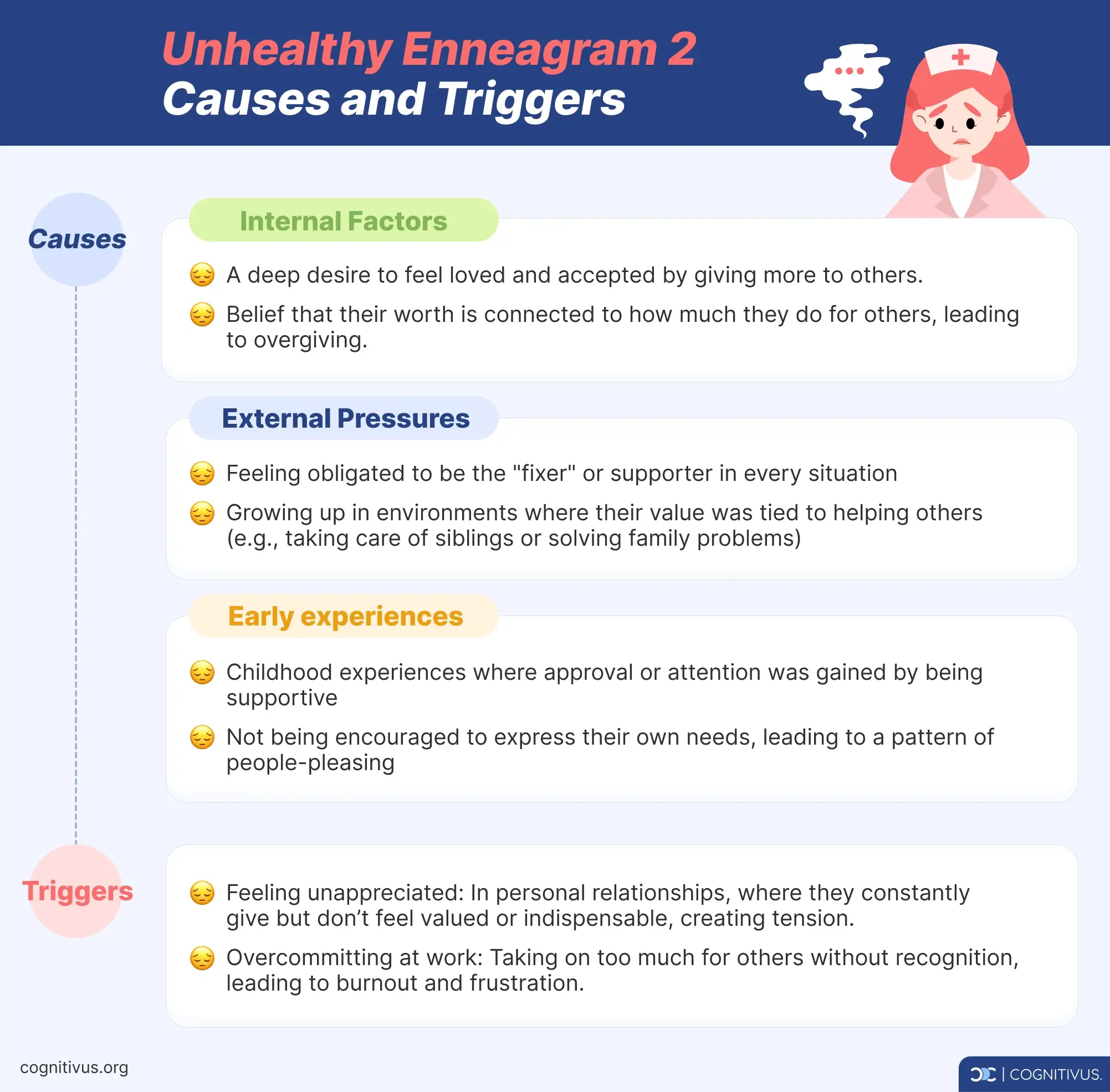
External pressures
Type 2s often feel external pressure to always be the person who helps and supports others. They feel like they have to help and to be the “fixer” in every situation.
For example, if a Type 2 grew up in a household where they were expected to take care of siblings or handle family problems, they might have learnt that their only value comes from helping others. This pressure can extend into adulthood, where they might overcommit themselves to friends, colleagues, or family members, feeling responsible for everyone’s well-being.
Over time, this constant need to nurture can really take a toll on them emotionally and physically.
Internal factors
Internally, Enneagram twos wrestle with a deep desire to feel loved and accepted.
They often believe that their worth is tied to how much they do for others, leading to a pattern of overgiving. This inner drive can create a cycle where Type 2s give more and more in hopes of receiving love or appreciation in return.
Unfortunately, they may neglect their own emotional and physical needs, leaving them feeling empty or resentful when they don’t receive the same level of care in return.
Early experiences
For many Enneagram twos, the habit of putting others first began in childhood.
Maybe they learnt that being supportive and helpful was the only way to gain approval or attention from their caregivers, and if they weren’t encouraged to express their own needs or feelings, they may have grown up believing that their own desires weren’t important.
This can turn into a lifelong habit of people-pleasing, where their self-worth is built on how much they can do for others, often to their own detriment.
The impact on personal and professional life
In personal relationships, unhealthy Type 2s may struggle with feeling unappreciated. They can feel like even though they’re constantly giving, they never get the appreciation they deserve. This deep need to feel indispensable can create tension in their relationships, leaving loved ones feeling overwhelmed, smothered, or even manipulated.
At work, unhealthy Type 2s might overcommit, taking on tasks for others at the expense of their own well-being. They may feel resentful if they aren’t recognised for their efforts, leading to frustration and burnout.
Steps Toward Growth for Type 2s
To grow, Enneagram twos can learn new ways to balance their desire to help others with self-care and healthier boundaries.
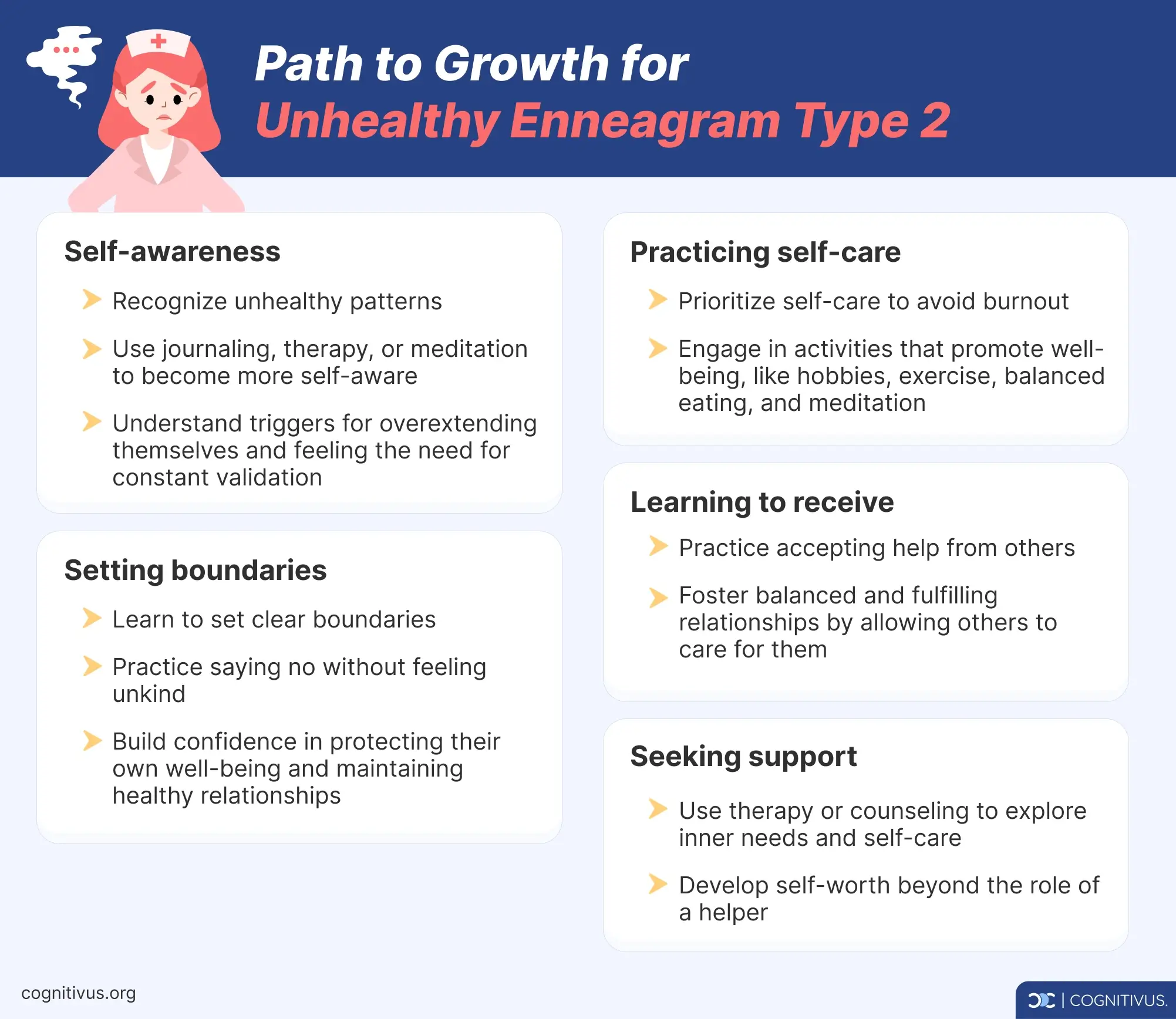
Self-awareness
The first step for Type 2s toward growth is recognising their own unhealthy patterns. Using journaling, therapy, or meditation to become more self-aware can help them to understand when they’re overextending themselves and why they feel the need for constant validation. Once they understand these triggers, they can start to change their habits.
Setting boundaries
It is so important to learn how to set clear boundaries. Saying no doesn’t mean they’re being unkind or unhelpful, but rather protecting their own peace and energy. It’s a necessary part of maintaining healthy relationships. By practicing this in small situations, they can build their confidence in creating these healthy boundaries to not only protect their own well-being, but their relationships too.
Seeking support
Therapy or counselling can provide a safe space for Type 2s to explore their inner needs, learn to prioritise self-care, and develop a stronger sense of self-worth that isn’t so wrapped up in their role as a helpers.
Practicing self-care
To avoid burning out, Type 2s must make self-care a priority. This can include various things, such as spending time alone, pursuing hobbies that bring them joy, exercising, eating balanced meals, meditating, going for a walk in nature, and many more! It’s all about learning to meet their own emotional needs without relying on others for validation.
Learning to receive
For Type 2s, it can feel uncomfortable accepting help from others, but it’s an important part of growth. They can really benefit from learning how to receive help and care from others, as this helps to create more balanced anf fulfilling relationships.
Conclusion: Moving Toward a Healthier Type 2
While Type 2s have an incredible natural gift for helping and caring for others, it’s also absolutely essential for them to find balance in their lives. By recognising their unhealthy tendencies and working toward self-awareness, setting boundaries, and practicing self-care, Type 2s can shift from overextending themselves to offering balanced, compassionate support. Not just for others, but for themselves too.
When Type 2s embrace their own worth – without needing constant validation – they open the door to more fulfilling, authentic relationships and a much deeper sense of peace within themselves. It’s about giving from a full cup, not an empty one!

